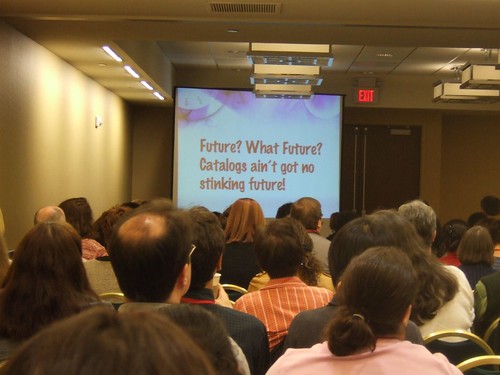Future of the Catalog

Tennant and Spalding on the Future of the Catalog
Originally uploaded by madinkbeard.
He gave us an example from Big (the movie) where Tom Hanks says that one of the toy ideas isn’t fun. Tim says that everyone is a toy company now. Users expect the web to fun and easy. If a site doesn’t change from visit to visit it’s boring - and our OPACs never change!!
Unlike other speakers on this topic, Tim thinks we need to bring the catalog out front and center. He says so used to hiding it behind our websites because we’re ashamed of it - and we can’t change it (which is very true).
So, how do we make it fun?
- Allow inbound links!
links into our catalogs are always timed out when you find them in search results. People want to link into this information and they assume it will always be there. One way to solve this is to provide a permalink - like Google maps - but I’d argue that this isn’t enough either!! - Allow links outwards
The more you link outwards the more people will come to you. This includes links out of your catalog. Tim said that some libraries say no to this because they won’t link to commercial sites. Tim asks, why? Your patrons know about the bookstores! Good websites don’t work like malls, where all of the exits are hidden and they try to keep you inside. - Link around
LibraryThing links to 500 libraries around the world and makes everything clickable (the author, title, tag, subject heading). There is also a page for every author, tag, etc etc. Most catalogs do link subjects - but nothing else. You can also link to wikipedia (people are going to go there anyway). - Dress up your OPAC
Dress it up with covers from Syndetics (if you get them from Amazon you have to link to them). - Get your data out there
Stop thinking you’re the only people who can work with your data!! Wisdom of crowds!! There are bored techies out there who want to do fun things with your data. People will think of things to do with your data that you haven’t thought of yourself. - Provide remixable content
Users don’t want your data. They don’t want generic new book lists, they want their own content. RSS feeds for specific searches, authors, tags. They want a way to tell people what they’re reading with widgets. If the user freely consents to show what they’re reading to others, then there are no privacy issues to worry about
Next up - Roy Tennant!!!
Roy was worried that we were all there to see Tim, but everyone stayed to hear what he had to say (well, I left a tiny bit early to make a lunch meeting - but I really really really wanted to stay).
Roy started by telling us that he refused to use the “O” word. And then told us that catalogs have no future - you’ve gotta love him!
Roy does clarify that when he says catalog he is not referring to the ILS (which libraries still need for internal operations). He is no suggesting the death of the ILS just that we rework the finding tool which is the catalog.
He sees a future where there is no local catalog and in his future, all discovery will take place on the network level. If however it stays on the local level, few people will want to limit their search to just books - they’re going to want something that can pull together all of the info on a topic no matter what format it’s in.
This means that we need to look at new models of finding information.
In the new world order, discovery will be disaggregated from the ILS (Google, Open WorldCat, meta search, others). This makess sense because users typically want to find anything they can on a topic. Now we have to explain that you have to look in different places for articles. People don’t like pain so they want to search in one spot and if they can’t then they won’t use your tool.
Most ILS lack cool new features and fall behind our expectations and the market doesn’t look great that we’re going to see these things anytime soon.
Open WorldCat is offering some of the cool tools we want (facets, integrated article index, clean easy to read display) all for free. They also have WorldCat Identities tool which allows for every author to have a page. Maybe the answer is that WorldCat replaces our union catalogs. OCLC already has all of our data (I don’t quite follow this - not being a cataloger - but it sounds good to me). Another tool that they have is Fiction Finder (both this and Identities like the things Tim was talking about with LibraryThing).
These tools are great at exposing the richness of the records we’ve been painfully creating over the years (and this is true - i had a horrible time creating MARC records for one of my assignments).
At this point I had to leave for lunch - but it all makes sense to me and I’ll keep an eye out to see if Roy’s predictions come true!
Technorati Tags: cil2007, cil07
Labels: cil2007
